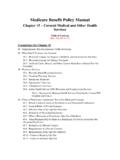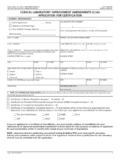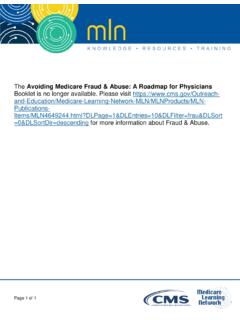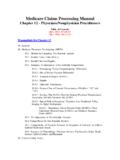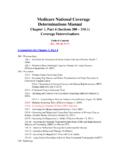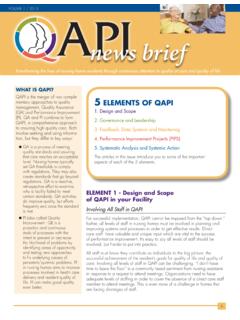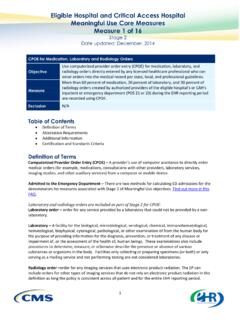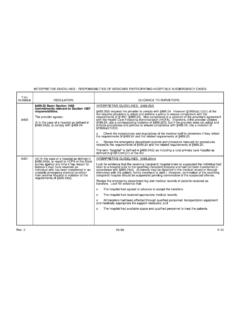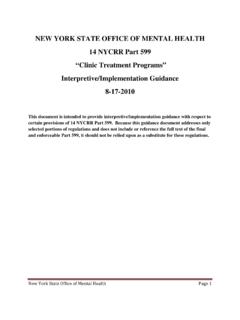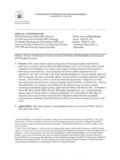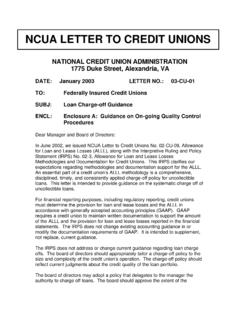Transcription of Center for Clinical Standards and Quality /Survey ...
1 TO DEPARTMENT OF HEALTH & HUMAN SERVICES Centers for Medicare & Medicaid Services 7500 Security Boulevard, Mail Stop C2-21-16 Baltimore, Maryland 21244-1850 Center for Clinical Standards and Quality /Survey & Certification Group Ref: S&C: 13-35-NH DATE: May 24, 2013 TO: State Survey Agency Directors FROM: Director Survey and Certification Group SUBJECT: Advanced Copy: Dementia Care in Nursing Homes: Clarification to Appendix P State Operations Manual (SOM) and Appendix PP in the SOM for F309 Quality of Care and F329 Unnecessary Drugs National Partnership On March 29, 2012, the Centers for Medicare & Medicaid Services (CMS) launched the National Partnership to Improve Dementia Care and Reduce Unnecessary Antipsychotic Drug Use in Nursing Homes (this is now referred to as the Partnership to Improve Dementia Care in Nursing Homes).
2 The goal of this Partnership is to optimize the Quality of life and function of residents in America s nursing homes by improving approaches to meeting the health, psychosocial and behavioral health needs of all residents, especially those with dementia. The CMS has joined with various stakeholders to improve dementia care in nursing homes. We are doing several things to support this work, including producing surveyor training videos as well as updating Appendix P and Appendix PP of the State Operations Manual (SOM). Individualized, person-centered approaches may help reduce potentially distressing or harmful behaviors and promote improved functional abilities and Quality of life for residents.
3 It has been a common practice to use various types of psychopharmacological medications in nursing homes to try to address behaviors without first determining whether there is a medical, physical, functional, psychological, emotional, psychiatric, social or environmental cause of the behaviors. Medications may be effective when they are used appropriately to address significant, specific underlying medical or psychiatric causes, or new or worsening behavioral symptoms. However, medications may be ineffective and are likely to cause harm -if given Memorandum Summary guidance This memo conveys clarification to Appendices P and PP related to nursing home residents with dementia and unnecessary drug use.
4 Training - Mandatory surveyor trainings are available online at Page 2 State Survey Agency Directors without a Clinical indication. All interventions, including medications, need to be monitored for efficacy, risks, benefits and harm. The problematic use of medications, such as antipsychotics, is part of a larger, growing concern. This concern is that nursing homes and other settings ( hospitals, ambulatory care) may use medications as a quick fix for behavioral symptoms or as a substitute for a holistic approach that involves a thorough assessment of underlying causes of behaviors and individualized, person-centered interventions.
5 Antipsychotic medications are frequently prescribed for residents with dementia who have behavioral or psychological symptoms of dementia (BPSD).1,2 The term BPSD is used to describe behavior or other symptoms in individuals with dementia that cannot be attributed to a specific medical or psychiatric cause. When antipsychotic medications are used without an adequate rationale, or for the purpose of limiting or controlling behavior of an unidentified cause, there is little chance that they will be effective. In addition, they commonly cause complications such as movement disorders, falls, hip fractures, cerebrovascular adverse events (cerebrovascular accidents and transient ischemic events) and increased risk of death.
6 3,4,5,6 The Food & Drug Administration (FDA) Black Box Warnings Regarding Atypical Antipsychotics in Dementia provides, Elderly patients with dementia-related psychosis treated with atypical antipsychotic drugs are at an increased risk of death compared to placebo. 7 Dementia Care Principles Fundamental principles of care for a resident with dementia include an interdisciplinary approach that focuses on the needs of the resident as well as the needs of the other residents in the nursing home. Sections 1819 and 1919 of the Social Security Act (the Act) and current regulations already require a number of essential elements to be in place in order for facilities to be in compliance with federal requirements on Quality of care and Quality of life.
7 This revised CMS guidance and surveyor training highlight and re-emphasize a number of those key principles, including: 1. Person Centered Care. CMS requires nursing homes to provide a supportive environment that promotes comfort and recognizes individual needs and preferences. 2. Quality and Quantity of Staff. The nursing home must provide staff, both in terms of quantity (direct care as well as supervisory staff) and Quality to meet the needs of the residents as determined by resident assessments and individual plans of care. 3. Thorough Evaluation of New or Worsening Behaviors.
8 Residents who exhibit new or worsening BPSD should have an evaluation by the interdisciplinary team, including the physician, in order to identify and address treatable medical, physical, emotional, psychiatric, psychological, functional, social, and environmental factors that may be contributing to behaviors. Page 3 State Survey Agency Directors 4. Individualized Approaches to Care. Current guidelines from the United States, United Kingdom, Canada and other countries recommend use of individualized approaches as a first line intervention (except in documented emergency situations or if clinically contraindicated) for Utilizing a consistent process that focuses on a resident s individual needs and tries to understand behavior as a form of communication may help to reduce behavioral expressions of distress in some residents.
9 5. Critical Thinking Related to Antipsychotic Drug Use. In certain cases, residents may benefit from the use of medications. The resident should only be given medication if clinically indicated and as necessary to treat a specific condition and target symptoms as diagnosed and documented in the record. Residents who use antipsychotic drugs must receive gradual dose reductions and behavioral interventions, unless clinically contraindicated, in an effort discontinue these drugs. NOTE: If during a survey, the team identifies a concern that an antipsychotic medication may potentially be administered for discipline, convenience and not being used to treat a medical symptom, the survey team should review F222 - (a) Right to be Free From Chemical Restraints.
10 6. Interviews with Prescribers. None of the guidance to surveyors should be construed as evaluating the practice of medicine. Surveyors are instructed to evaluate the process of care. Surveyors interview the attending physician or other primary care provider (NP, PA), behavioral health specialist, pharmacist and other team members to better understand the reasons for using a psychopharmacological agent or any other interventions for a specific resident. 7. Engagement of Resident and/or Representative in Decision-Making. In order to ensure judicious use of psychopharmacological medications, residents (to the extent possible) and/or family or resident representatives must be involved in the discussion of potential approaches to address behavioral symptoms.

